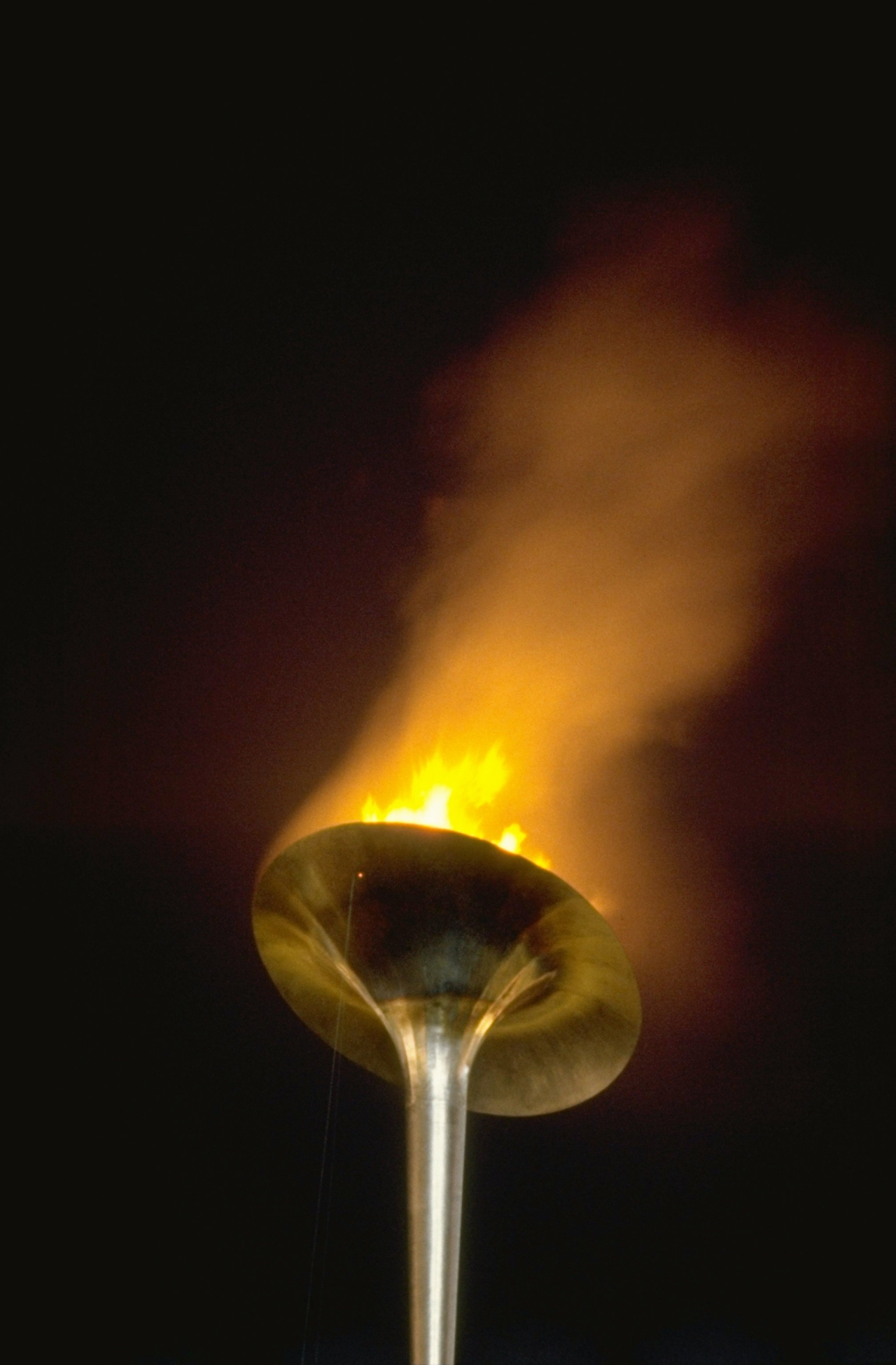

Photograph by Allsport UK / Allsport / Getty Images
WORDS BY JASON P. DINH
Tennis star Daniel Medvedev’s life flashed before his eyes at the 2020 Tokyo Olympics. As temperatures approached 38°C, the second-seeded player in the tournament called a flurry of medical timeouts. “I can finish the match,” he told the umpire, “but I can die. If I die, are you going to be responsible?”
Now, as this year tracks to be the hottest on record, experts are warning that the 2024 Paris Olympics could be even worse. In a new report, Rings of Fire: Heat Risks at the 2024 Paris Olympics, published by the British Association for Sustainable Sport, 11 Olympians and a team of scientists wrote that extreme heat could harm, injure, and even kill this summer’s Olympic athletes. They implored Olympic organizers to establish heat protections, and they demanded that the sporting world cut ties with fossil fuels.
“We need to transition away from fossil fuels as quickly as possible,” said Jamie Farndale, a rugby sevens player for Great Britain, at a press briefing. “It’s as simple as that.”
The report found that annual temperatures in Paris have increased by 1.8°C since the city last hosted the Olympics in 1924. During the dates in July and August that this year’s Olympics take place, average temperatures are 3.1°C higher now than they were then.
The risk of heat waves has risen in the last century, too, the report finds—for example, an August heat wave in Paris killed over 15,000 people in 2003, and another last summer killed 5,000 across France.
“I still am just surprised of the timing of these Olympics. I mean we have seen such deadly heat waves in this exact location at this exact time, many times in recent history,” said report author and Climate Central researcher Kaitlyn Trudeau at a press briefing.
Indeed, as recently as 2000, the Olympics have commenced in September. But according to Jules Boykoff, a former professional soccer player who now studies sports and politics at Pacific University, organizing groups are loath to do so now because delaying the games would cause scheduling conflicts with American football—something that broadcasters, which account for 61% of the International Olympic Committee’s revenue, don’t want. “You can learn a lot about the Olympic system if you follow the money,” said Boykoff, who wasn’t involved with the report.
“Athletes have become the moral conscience of sport.”
From a competitive standpoint, the Olympians involved in the report emphasized how heat makes athletic performance more challenging, both physically and psychologically. The threat is obvious for endurance sports athletes like marathon runners, but it also affects power athletes. Eliza McCartney, a pole vaulter from New Zealand who won a bronze medal in 2016, said in the report that excess sweat causes her to lose grip with the pole, risking accidents and injury.
From a health standpoint, heat can cause cramps, dizziness, exhaustion, heat stroke, and even death. In the report, New Zealand tennis bronze medalist Marcus Daniell recounted his fear when playing “in conditions where an egg can literally be fried on the court,” describing it as a “risk that could potentially be fatal.” British Marathon swimmer Amber Keegan expressed similar trepidations. “We do all get in that water knowing that people have died from the heat,” she said.
Freddie Daley, a researcher at the University of Sussex and campaigner with the climate group Badvertising who wasn’t involved in the report, said that it’s the first time he’s seen athletes from so many different sports come together to demand climate action—a testament to the power of the Olympics. “Hopefully, it will encourage others to do so and show that you don’t have to be a climate expert to talk out on climate change,” he said.
Daley added that he found the report’s recommendations warranted and well-supported, yet surprisingly radical. In addition to advocating for heat protections, the report calls for sports organizations to oust fossil fuel sponsorships from athletics.
Between 2020 and 2022, 16 of the world’s 25 largest fossil fuel companies sponsored or owned a soccer club, according to The Athletic. This year, the NBA partnered with Emirates, branding their hoops, courts, and referee uniforms with the airline’s insignia. World-class athletes are even taking their talents to petrostates, completing massive transfer deals and signing lucrative contracts to play in Saudi Arabia, all made possible by the nation’s federal dollars. “Everywhere you look in sport, you’re going to see fossil fuels,” Daley said.
There are inklings of change as individual players and organizations spurn fossil fuel sponsorships. Last year, the English rugby union governing body rejected a £2.5 million deal with ExxonMobil, and in 2022, Tennis Australia terminated its partnership with the oil and gas company, Santos.
“You can make a little more money short term working with these fossil fuel companies, but in the long term you’re undermining the health of your sport and your ability to make money—and the entire planet, so it’s just immoral.”
Ostensibly, Paris 2024 seeks to join the sustainability movement, committing to hosting a “climate-positive” Olympics by slashing emissions from construction, transportation, and operations—a plan the watchdog group Carbon Market Watch describes as insufficient and opaque, but still “decent.” Boykoff said that assessment is spot on. He doesn’t want to minimize what the Paris organizers have done—for example, reducing emissions from construction and prioritizing plant-based food—but the carbon accounting is still not publicly available or independently audited. “The bar is sitting on the floor and the Paris 2024 organizers tiptoed over,” he said.
As the report points out, fossil fuel companies are still sponsoring several national teams: British Gas and BP for Great Britain, Hancock Prospecting for Australia, and Reliance Industries Limited for India. The Olympics themselves hold several sponsorships closely tied to fossil fuels, too: Toyota, steel producer ArcelorMittal, and Air France.
The fight for fossil-free sports transcends the game itself, said Farndale, the rugby player. A movement within sports could ignite social change more broadly. “Something that I’m really keen for sport to do here is be an alarm bell in this space,” he said.
Indeed, the societal sway of sports has proven influential in recent years. In 2016, NFL quarterback Colin Kaepernick became an icon for racial justice, and soccer star Megan Rapinoe began ushering in a new era of LGBTQ+ and gender activism. In some ways, the athletes speaking out about climate change in the new report is part of this larger trend. “Really, athletes have become the moral conscience of sport,” Boykoff said.
Athletes might be precisely the mouthpieces the climate movement needs. They hold public trust and social sway, and they attract an audience that typically hasn’t engaged with or been targeted by the climate movement, like working class communities and conservatives. “To speak with them in a way that isn’t paternalistic, and using the language of football, using a sports club, which is often an anchor within a community, to create a safe space to have these conversations?… I think it could be a real game changer,” Daley said.
Even if all you’re concerned about is sports, continued investment into fossil fuels is myopic, said Sam Mattis, a U.S.A. Olympic discus thrower, at a press briefing. “Penny wise, dollar dumb,” he quipped. “You can make a little more money short term working with these fossil fuel companies, but in the long term you’re undermining the health of your sport and your ability to make money—and the entire planet, so it’s just immoral.”
Olympic Athletes Demand Sports Cut Ties with Fossil Fuels in New Report